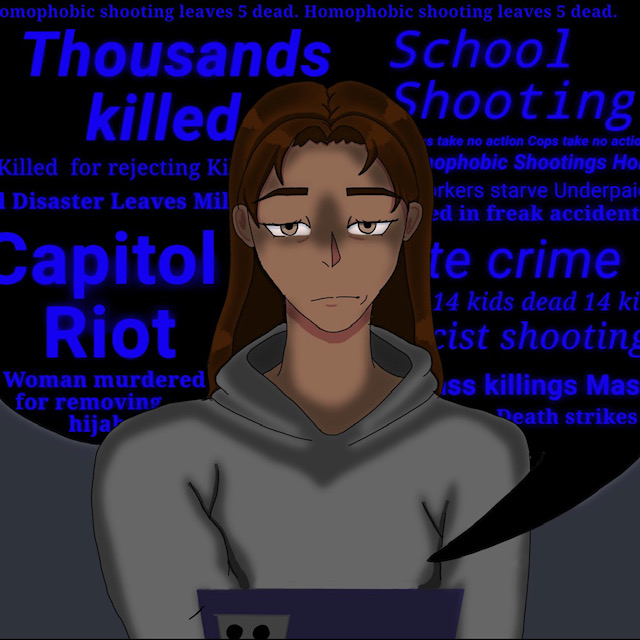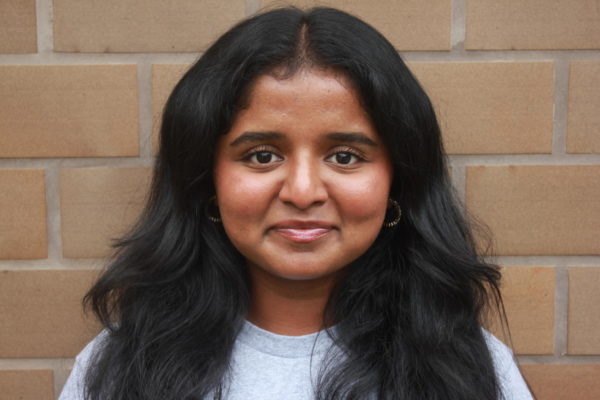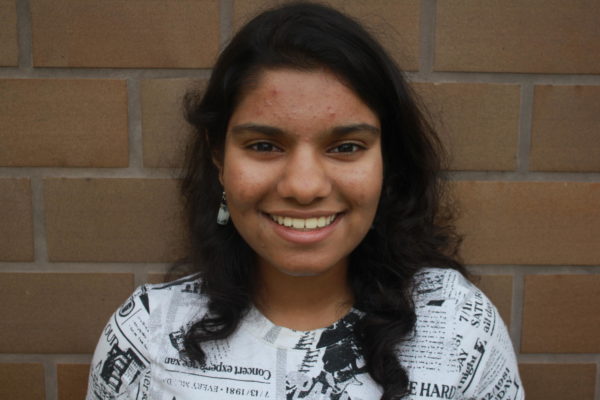Subject to Change: Desensitization is the death of humanity
Desensitization to negative information is very dangerous as we become indifferent to terrible events.
December 9, 2022
Dear reader,
Blood on concrete. Urgent news reports. Flowers on a grave. A spilled tear or two. Our hope towards a better, brighter future. Thoughts and prayers for a brief week. Then, headlines will begin to fade along with our care for the situation.
This is how our nation reacts to every school shooting.
On Friday, November 4, Dougherty Valley High School went on lockdown due to a shooting threat found in a bathroom stall.
I was sitting in my first-period AP World History class when this announcement was made. My teacher followed the protocol while the students looked at each other with slight discomfort. We carried on with the day’s lesson, nonetheless. Something this concerning, a school shooting threat, should have caused hysteria or concern within me – but it wasn’t until the third period that day when my teacher took a minute to address the day’s circumstances to attention that I fully comprehended the gravity of the situation we were in. A school shooting threat. That’s the reality of the situation. Somebody wrote that they were going to shoot students in our school on that day.
Thanks to the San Ramon Police Department’s timely and level-headed response, we were given a sense of confidence in being present on campus. With the assurance of safety with police presence, I left school that day. But, I left school wondering what would’ve happened if the threat was real. Would I have regretted not acknowledging the gravity of the situation the instant the lockdown announcement was made if there really was a school shooting?
I’m writing this column almost a month after the 4th of November and I still can’t accept my initial indifference toward this situation. What scares me the most is not my reaction, but the fact that almost every other person sitting in my first-period classroom with me also “shook off” this feeling. It’s not that we’re incapable of compassion. It’s not that we lack sympathy. Then why weren’t we sensitive to this situation? Turns out, it’s a coping mechanism.
The Sandy Hook massacre happened in 2012 and its effects reverberated across the nation. In 2022, school shootings are so common we tend to almost “normalize” them. This indifferent mindset is gravely dangerous.
There’s a term for this that I’d like to explore: collective desensitization. It’s human nature to be adaptive to their environment. The fact that we’ve somehow adapted to constant negative input through sources such as the media and events surrounding us is what makes our adaptive response a double-edged sword. The desensitization of humanity has been brutally diminishing our capacity to care. It’s simply a psychological response that we humans carry out.
I will admit, I’m personally guilty of feeling indifferent in these situations. I, too am tired of the constant flush of negative information I receive in my life – especially when it comes to media. However, there’s specifically one method I can assure you is effective – staying vigilant about our media consumption. The media tends to report more negative events, so it’s critical we filter out news in order to suppress our psychological responses to inhibit insensitivity. I’m not stating that we’re required to go into a state of shock or overreact to threats. After all, threats can just be threats. I’m stating we should remain vigilant.
Take a recent school shooting for example – the Uvalde school shooting. It’s been a mere seven months since the shooting and the media is still reporting the aftermath. None of us talk about it. We’ve moved on and we’ve forgotten this situation. However, the families of the victims have not. We tend to forget hundreds of schoolchildren will never return to school again.
The problem with desensitization is not about us and our feelings, but more generally the consequences of not feeling. When we start to not care and ignore others, we’re negatively affecting others. We play into being bystanders by not acting upon these situations. In situations of distress, it’s our responsibility to care for victims and respond properly, whether that’s donating to help the families of the victims or keeping tabs on the action taken to prevent this situation from happening again.
If we lack compassion and sensitivity in turmoil, we’re playing into the bystander effect. For example, in the Holocaust, the bystander effect played a major role in the lives of the Jewish that were victims of this mass genocide. If the bystanders of the situation had learned to care and understand the gravity of the situation, there’s no denying the Holocaust would’ve been more defended and widely unaccepted than it is currently.
Putting ourselves in others’ shoes, understanding the urgency of the situation and adequately battling these situations is key to solving the problem of desensitization. I personally am working on being more aware of my mindset toward events of urgency – whether it’s a school shooting, a war or a local incident. It’s hard, especially since I’ve grown up in a world where violence is no stranger, to remain sensitive to events of any degree.
The way a nation reacts to moments of distress ultimately comes down to the people who comprise this country – that’s each and every one of us. It’s finally time we turn collective desensitization into individual mindfulness.
Until next time,
Shreya Arun




